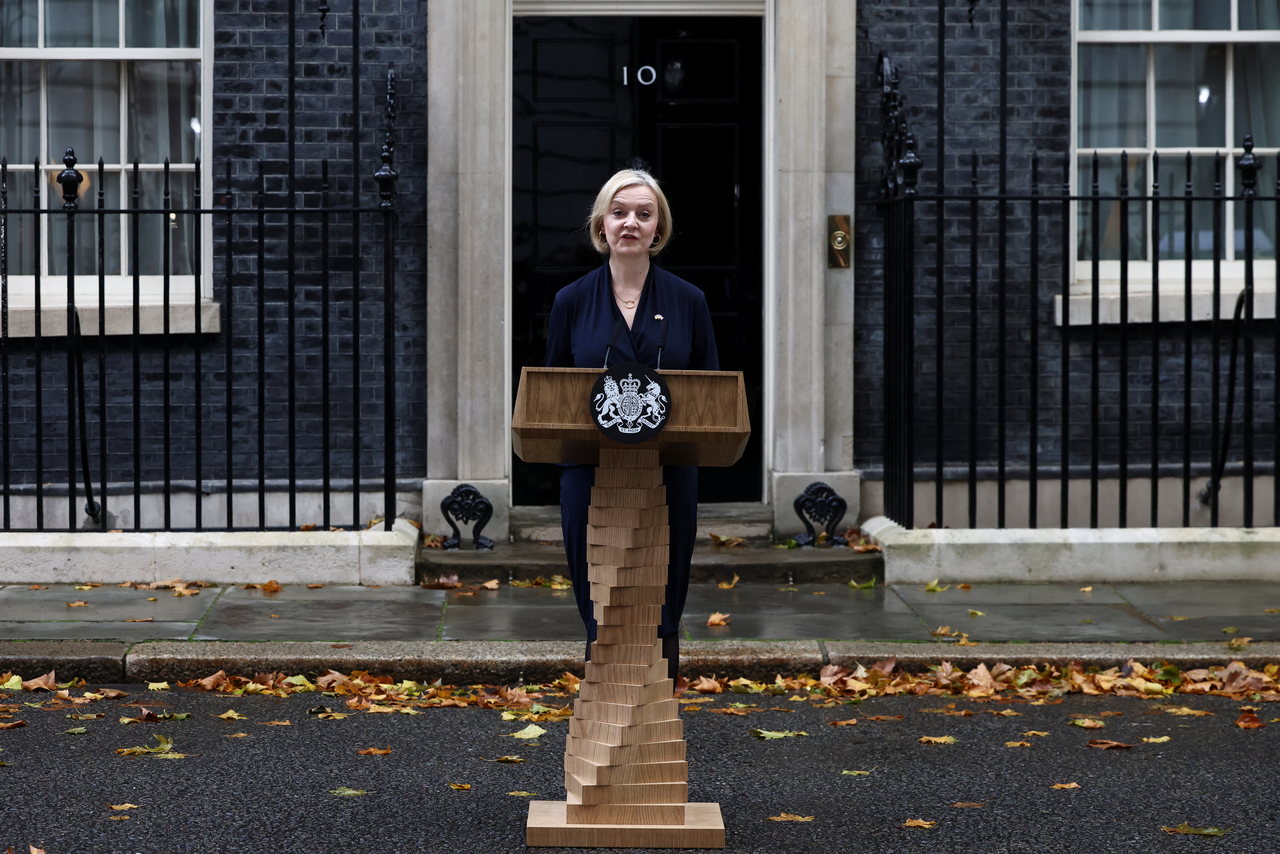The Truss Government Falls-the Fastest in British History
UK Prime Minister Liz Truss resigned on 20 October after just seven weeks in office. In that short time, there were numerous conflicts within the ruling Conservative Party. The neoliberal economic vision of the Tories’ right wing also failed. The procedure for selecting a new prime minister will be significantly simplified and is expected to be completed within a week due to the budget statement scheduled for the last day of October.
 HENRY NICHOLLS/ Reuters/ FORUM
HENRY NICHOLLS/ Reuters/ FORUM
What were the reasons for Truss’s resignation?
The immediate cause was the loss of confidence in Truss by her parliamentary backing, initially communicated publicly by individual parliamentarians and then behind closed doors through the 1922 Committee of Tory backbench MPs. It was mainly caused by unexpected changes in economic and immigration policy, which led to the resignation of members of her cabinet. Negative market reactions to the government’s initial plan to increase public debt and simultaneously cut taxes forced the prime minister to dismiss Chancellor of the Exchequer Kwasi Kwarteng on 14 October. His successor, Jeremy Hunt, reversed the original strategy by announcing cuts in public spending and tax increases. Truss also entered into a dispute over the model of immigration policy, which brought her into conflict with the party’s right wing and resulted in the resignation of Home Secretary Suella Braverman on 19 October.
What factors drove the cabinet crisis?
Truss’s position was relatively weak from the beginning, as she was supported by only 30% of the MPs. Although she appointed five of her counter-candidates to the cabinet, she omitted the most important representatives of the Tories’ left wing—Rishi Sunak and Hunt—and their supporters. The cabinet’s programme, however, was shaped by the right wing of the Tories, which is pro-Brexit, but libertarian. As a consequence, the resignations of Kwarteng and Braverman shifted the government to a position closer to the party’s left wing, undermining Truss’s programme. The crisis exacerbated the collapse of the Tories in polls by as much as 30 percentage points compared to Labour. This stemmed from the economic programmes of both Kwarteng and Hunt, as well as the liberal immigration policy, negating the expectations of voters backing the Tories and won by Boris Johnson in 2019 who are pro-Brexit, but also pro-social spending and anti-immigration.
How will the new prime minister be selected?
Due to the economic challenges and concerns about the destabilisation of the British economy resulting from the lack of an efficient government, the rules for selecting the new Tory leader and the prime minister were changed in comparison to those adopted in July. The starting threshold has been raised: instead of 20 MPs, candidates will need 100 such backers, which limits the maximum number of candidates to three. The timeframe for the party elections was limited to seven days (i.e., until 28 October), with two parliamentary votes scheduled for 24 October: a winnowing poll, which would eliminate one candidate, and an indicative one, which will indicate to the party members the candidate favoured by MPs. Should one of the two final candidates resign, the popular vote of party members would be omitted. Consultations between the factions to work out exactly this solution are reportedly underway. Among those possibly running for the premiership are the main opponents of Truss in the July-September process—Sunak and Penny Mordaunt. Boris Johnson considered entering the race.
What does the current crisis mean for British-EU relations?
The fall of Truss will suspend the EU-British negotiations on the implementation of the post-Brexit Protocol on Ireland and Northern Ireland. These talks are of particular importance in the context of the blocking by the Unionists since February this year of the establishment of a devolved government until their objections to the Protocol are considered. In particular, they seek the lifting of CJEU oversight over the Protocol’s implementation in Northern Ireland and the restriction of controls on the maritime border between Great Britain and Northern Ireland. If the devolved government is not be formed by 28 October, then snap Northern Ireland Assembly elections will be necessary. The unionist campaign will then focus on blocking the extension of the Protocol in 2024. The change of the British government also complicates talks with the EU on a new model of cooperation in the field of foreign and security policy initiated at the recent European Political Community summit in Prague. Although British aid for Ukraine enjoys broad support, the budget policy of the new government will determine its real dimension.


